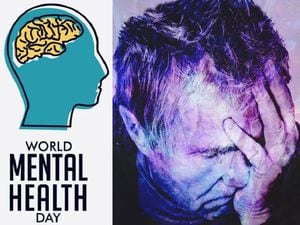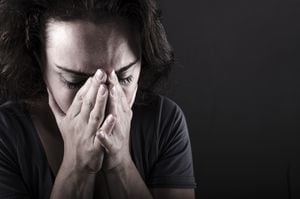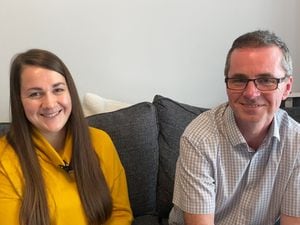World Mental Health Day: Tackling anxiety is key - with five essential tips to de-stress your life
Anxiety is one of the most common mental health conditions in the UK – with one fifth of adults experiencing it at some point in their lives.

And children are increasingly facing problems with anxiety and depression, as new figures show that around 850,000 young people aged five to 16 are battling a mental health problem.
According to the most recent figures from the Office for National Statistics (ONS), there was evidence of anxiety or depression in 19 per cent of people aged 16 or over, with 21 per cent of women reporting the symptoms and 16 per cent of men.
Dementia is also on the rise, with 500,000 cases recorded in England and Wales over the last year.
Today marks World Mental Health Day, and experts have given a timely reminder that good mental health is essential for strong physical health and well being, as well as strong relationships.
First celebrated 26 years ago, World Mental Health Day has arguably become more important as issues surrounding mental illness become more widespread as people battle to deal with the pressures and breakneck pace of modern society.
What is World Mental Health Day?
World Mental Health Day is a day for global mental health education, awareness and advocacy against social stigma. It was first celebrated in 1992 at the initiative of the World Federation for Mental Health, a global mental health organization with members and contacts in more than 150 countries. Source - Wikipedia
Need help?
Help and advice for those having a mental health crisis is available from a number of agencies in Shropshire.
Shropshire Mind - 01743 368647 or shropshiremind.org
Samaritans - 116 123 or samaritans.org
Access Service for Adult Mental Health - 03001 240365
Nicky Lidbetter, CEO of the charity Anxiety UK, says that anxiety has risen in prominence to such an extent that more than 45 million working days have been lost due to it in the UK in the past three years.
"Psychological symptoms of anxiety include worry, spinning thoughts and insomnia due to a racing mind," she said.
"Anxiety can also affect the body – causing issues such as a racing heartbeat, nausea, headaches and muscle tension. These symptoms can feel very distressing.

"Modern life consists of situations to constantly worry about, something the body just isn’t prepared for.
"Common triggers of anxiety include work, social situations and financial pressures. It’s no wonder an increasing number of people suffer from anxiety.
“If left untreated, anxiety can lead to long-term difficulties, which can significantly impact on daily living and quality of life."
For people who find themselves feeling anxious, these five simple tips are well worth remembering:
Practice breathing exercises - If you’re feeling anxious, try taking slow deep breaths; calmly inhaling for four seconds through your nose, then exhaling for the same via your mouth.
Exercise it out - Exercising for just one minute can give you the same benefits as between 90 and 120 minutes of relaxation, thanks to the 'feel good' endorphins that are released.
Share your worries - Talking to a trusted family member or friend can make your worries seem less daunting and help you realise that you are not alone.
Embrace a meditation practice - Meditation helps to calm the mind and body, combat stress and improve your sleep. If you’re new to meditation, start off small and increase your mediation sessions over time. There are numerous free guided meditation sessions available online. Try a 10-15 minute session to start with once a day, then build it up once you start to feel the benefits.
Try an anxiety relieving traditional herbal remedy - Herbal remedies have increased in popularity in recent years, with old favourites such as St John's Wort now supplemented by all manner of potions as many people look for something away from the often daunting proposition of prescribed medication. Studies have shown lavender to be effective at relieving anxiety, with products such as Kalms Lavender oil having a long-standing association with relieving symptoms including stress and nervousness.
For anyone suffering from mental health issues who believes they require professional help, a number of options are available according to Dr Alexandra Phelan, a GP with the NHS and Pharmacy2U.
Many mental health and counselling services are available via the NHS, but you may need a referral from your GP to access them.
A few services – including those for drug or alcohol-related problems and some psychological therapy services – allow people to refer themselves.
If you’ve been feeling low for more than a few weeks, or anxiety or stress is affecting your daily life – perhaps stopping you going to work or socialising – you should make an appointment to see your GP.
After an initial assessment, your GP may offer advice and/or treatment and, if necessary, make a referral to either a therapy or specialist mental health service.
Shropshire Star comment:
If your mental health difficulty is work-related, you could ask your employer what occupational health services are available to you.
If you are at college or university, mental health care may be available to you via student support services.
Children and young people may need help with a range of issues at different points in their lives, and parents may also need advice on how to deal with emotional or behavioural problems.
CAMHS (child and adolescent mental health services) teams are arranged regionally across the UK, and usually have their own website with details about access and referrals, as well as contact details.





